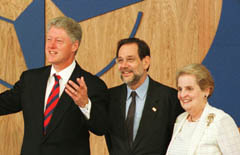Javier Solana facts for kids
Quick facts for kids
The Most Excellent
Javier Solana
|
|
|---|---|
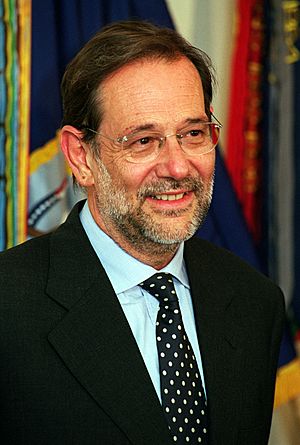
Solana in 1999
|
|
| High Representative for Common Foreign and Security Policy | |
| In office 18 October 1999 – 1 December 2009 |
|
| Preceded by | Jürgen Trumpf |
| Succeeded by | Cathy Ashton (Foreign Affairs and Security Policy) |
| Secretary General of the Council of the European Union | |
| In office 18 October 1999 – 1 December 2009 |
|
| Preceded by | Jürgen Trumpf |
| Succeeded by | Pierre de Boissieu |
| Secretary General of the Western European Union | |
| In office 20 November 1999 – 1 December 2009 |
|
| Preceded by | José Cutileiro |
| Succeeded by | Arnaud Jacomet |
| 9th Secretary General of NATO | |
| In office 5 December 1995 – 14 October 1999 |
|
| Preceded by | Sergio Balanzino (Acting) Willy Claes |
| Succeeded by | The Lord Robertson of Port Ellen |
| Minister of Foreign Affairs | |
| In office 16 June 1992 – 18 December 1995 |
|
| Prime Minister | Felipe González |
| Preceded by | Francisco Fernández Ordóñez |
| Succeeded by | Carlos Westendorp |
| Personal details | |
| Born |
Francisco Javier Solana de Madariaga
14 July 1942 Madrid, Spain |
| Political party | Spanish Socialist Workers' Party |
| Spouse | María de la Concepción Giménez Díaz-Oyuelos |
| Children | 2 |
| Education | Complutense University University of Virginia |
| Signature |  |
Javier Solana (born July 14, 1942) is a Spanish physicist and politician. He held many important jobs in his career. He was Spain's Foreign Affairs Minister from 1992 to 1995. After that, he became the Secretary General of NATO (North Atlantic Treaty Organization) from 1995 to 1999. NATO is a group of countries that work together for defense and peace.
From 1999 to 2009, Solana was the European Union's (EU) top diplomat. This role was called the High Representative for Common Foreign and Security Policy. He also served as the Secretary General of the Council of the European Union during this time.
Contents
Early Life and Education
Javier Solana was born in Madrid, Spain. His family was well-known in Spain. His father was a chemistry professor. Javier was the third of five children. His older brother, Luis, was involved in politics against the government at the time.
Solana went to a Catholic school in Madrid. Later, he studied at Complutense University in Spain. In 1964, he secretly joined the Spanish Socialist Workers' Party (PSOE). This party was not allowed to operate openly during that time.
In 1965, he moved to the United States on a scholarship. He studied at different universities, including the University of Virginia. There, he taught physics and did his own research. He also took part in protests against the Vietnam War. In 1971, he earned his doctorate degree in physics. His research was about how tiny particles behave in liquid helium.
After returning to Spain, he became a physics teacher. He taught about solid-state physics at the Autonomous University of Madrid and later at Complutense University. He wrote more than 30 articles on physics.
Entering Spanish Politics
When Solana came back to Spain in 1971, he became involved in politics. He joined a group that worked for democracy in Madrid. In 1976, he was chosen as a leader in the PSOE party. He was a close friend of the party's leader, Felipe González. Solana helped change the PSOE party after the time of Francisco Franco's rule.
In 1977, he was elected to the Spanish parliament. He represented the Madrid area until 1995. In 1981, he was in the parliament building when it was taken over by gunmen in an attempted coup.
In 1982, the PSOE party won a big election. Solana became the Minister for Culture. He held this job until 1988, when he became the Minister of Education. In 1985, he also became the government's spokesperson.
In 1992, he became the Minister for Foreign Affairs. He helped organize an important meeting in Madrid for leaders from Spain and Latin American countries. In 1995, he led a conference in Barcelona that brought together 27 nations. This meeting aimed to improve cultural and economic ties in the Mediterranean region.
During his 13 years as a minister, Solana became known as a calm and skilled diplomat. He avoided political problems that affected other government members. Towards the end of 1995, he was considered a possible leader for his party. However, he decided to move into international politics instead.
Leading NATO
On December 5, 1995, Javier Solana became the new Secretary General of NATO. He took over from Willy Claes. His appointment was a bit surprising because he had been against NATO in the past. He had even written a pamphlet called 50 Reasons to say no to NATO.
However, after his party came to power, Solana and the PSOE changed their views. They began to support Spain's role in NATO. In 1986, Spain held a vote on whether to stay in NATO, and Solana campaigned for staying. He explained that NATO had changed since the Cold War and was now different.
As NATO Secretary General, Solana immediately faced a big challenge: the mission in the Balkans. NATO sent 60,000 soldiers to Bosnia to keep the peace. This mission was called Operation Joint Endeavour. Later, a smaller force called SFOR took over.
During his time, NATO changed its structure and strategies. Solana became known as a successful diplomat. He was good at getting different NATO countries to agree. He also helped improve relations between NATO and countries that were not members, like Russia.
The situation in the former Yugoslavia remained difficult. In 1999, fighting in Kosovo got worse. NATO decided that military action was needed to stop the conflict. On March 24, NATO forces began air attacks on targets in Yugoslavia. Solana said these attacks were necessary to protect people and prevent more ethnic cleansing.
Solana and NATO faced criticism for civilian casualties during the bombings. On June 10, Serbian forces left Kosovo, and NATO stopped its attacks. Solana left NATO in October 1999.
EU Foreign Policy Leader
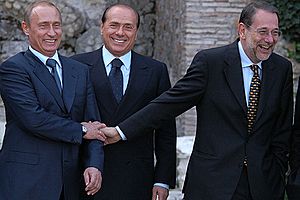
After leaving NATO, Solana took on a new role in the European Union. In June 1999, he was chosen to be the Secretary-General of the Council of the European Union. He also became the High Representative for the Common Foreign and Security Policy (CFSP). In this job, he represented the EU in other countries when they had a common policy. He started this role in October 1999.
From November 1999, he also led the Western European Union (WEU), helping to move its duties to the EU's foreign policy. In 2004, his five-year term was renewed. He also became the head of the European Defence Agency.
In 2003, Solana released the European Security Strategy. This document explained the main goals and threats to the EU's security, including terrorism. In 2004, he appointed an anti-terrorist coordinator for the EU.
A new position was planned for the EU called "Union Minister for Foreign Affairs." This job would combine Solana's role with another EU foreign policy role, giving Europe a stronger voice in the world. This position was later changed to High Representative of the Union for Foreign Affairs and Security Policy. Solana decided not to take this new role when his term ended.
In 2004, Solana held secret talks with leaders of Hamas. He said he met them to send a clear message about what the international community wanted.
Working on World Issues
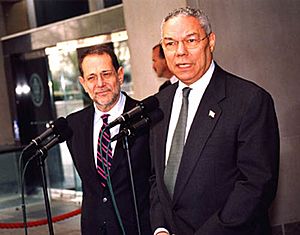
Solana helped negotiate agreements between the European Union and countries in the Middle East and Latin America. He also played a key part in bringing together parts of the former Yugoslavia. He suggested that Montenegro should form a union with Serbia instead of becoming fully independent.
In 2002, Solana stated that people held at Guantanamo Bay should be treated as prisoners of war. The EU wanted to avoid another war like the Iraq War. Solana said the hardest parts of his job were when the United Kingdom and France, two important EU members, disagreed.
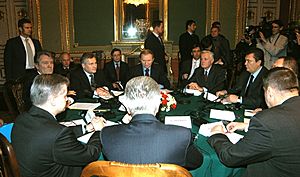
Solana was very involved in trying to solve the Israeli–Palestinian conflict. He helped create the "Road Map for Peace" with the UN, Russia, and the United States. In 2004, he met with Ariel Sharon, the Israeli Prime Minister. Solana also criticized Israel for making it difficult to hold the Palestinian presidential election in 2005.
In November 2004, Solana helped the United Kingdom, France, and Germany negotiate with Iran about its nuclear program. In the same month, he helped mediate between presidential candidates in Ukraine after their election. He invited Ukraine's new President, Viktor Yushchenko, to discuss future EU membership.

In 2010, after he left office, Solana signed a petition with other EU leaders. They asked his successor, Catherine Ashton, to consider sanctions on Israel because of continued settlement building.
Other Activities and Personal Life
Javier Solana is married to Concepción Giménez, and they have two children. He lives in Brussels. He speaks Spanish, French, and English fluently.
General Wesley Clark once asked Solana the secret to his diplomatic success. Solana replied: "Make no enemies, and never ask a question to which you do not know or like the answer." He is known for being able to find solutions to difficult problems.
Many people have praised Solana for his ability to build agreement between different groups. He is often a speaker at important international meetings. He is also involved with several organizations that work to promote good governance and human rights around the world.
Solana has received many awards and honors for his work in diplomacy and for European unity. These include the Charlemagne Prize in 2007 and the Order of the Golden Fleece in 2010.
In March 2020, Solana was hospitalized after getting COVID-19.
Awards and Honours
Spanish Honours
 Knight Grand Cross of the Civil Order of Alfonso X, the Wise (1996)
Knight Grand Cross of the Civil Order of Alfonso X, the Wise (1996) Knight Grand Cross of the Order of Charles III (1997)
Knight Grand Cross of the Order of Charles III (1997) Knight Grand Cross of the Order of Isabella the Catholic (2000)
Knight Grand Cross of the Order of Isabella the Catholic (2000) Knight of the Order of the Golden Fleece (2010)
Knight of the Order of the Golden Fleece (2010)
Other Countries
 Grand Officer of the Order of the White Lion (Czech Republic, 1998)
Grand Officer of the Order of the White Lion (Czech Republic, 1998) Honorary Knight Commander of the Order of St Michael and St George (United Kingdom, 2000)
Honorary Knight Commander of the Order of St Michael and St George (United Kingdom, 2000)- Manfred Wörner Medal of the Federal German Ministry of Defence (Germany, 2002)
 Recipient of the Order for Exceptional Merits (Slovenia, 2004)
Recipient of the Order for Exceptional Merits (Slovenia, 2004) Grand Cross of the Order of Merit of the Republic of Poland (Poland, 2005)
Grand Cross of the Order of Merit of the Republic of Poland (Poland, 2005) Commander Cross of the Order of the Lithuanian Grand Duke Gediminas (Lithuania, 2005)
Commander Cross of the Order of the Lithuanian Grand Duke Gediminas (Lithuania, 2005) Grand Cross of the Order of Merit of the Federal Republic (Germany, 2007)
Grand Cross of the Order of Merit of the Federal Republic (Germany, 2007) Grand Cross of the Order of Christ (Portugal, 2010)
Grand Cross of the Order of Christ (Portugal, 2010) Knight of the Georgian Order of the Golden Fleece (Georgia, 2010)
Knight of the Georgian Order of the Golden Fleece (Georgia, 2010)
Awards
- Vision for Europe Award, Edmond Israel Foundation (2003)
- Statesman of the Year Award, EastWest Institute (2003)
- Wateler Peace Prize, Carnegie Foundation (2006)
- Peace Through Dialogue Medal, Munich Security Conference (2007)
- Charlemagne Prize (2007)
- Peace Award of the World Children's Parliament (2008)
- Extraordinary Prize of the Spanish Ministry of Defence (2009)
- Convivencia Award, Manuel Broseta Foundation (2009)
- Charles V European Award, European Academy of Yuste Foundation (2010)
- Ewald-von-Kleist Award, Munich Security Conference (2010)
- Knight of Freedom Award, the Casimir Pulaski Foundation
- Honorary degree (political science), London School of Economics
- Gold Medal of the Jean Monnet Foundation for Europe (2011)
Images for kids
See also
 In Spanish: Javier Solana para niños
In Spanish: Javier Solana para niños
 | Laphonza Butler |
 | Daisy Bates |
 | Elizabeth Piper Ensley |


